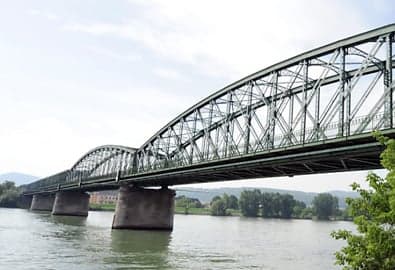Study finds high level of 'microplastic' in Danube

The beautiful blue Danube may not be as clean as it looks. Austrian researchers who have been studying pollution in Europe’s second longest river say they found 80 kilograms of plastic particles in the water every day, in a project that documented for the first time the volume of 'microplastic' in the river.
Lowering specially designed nets into a section of the Danube in Upper Austria, researchers from the Federal Environment Agency and Vienna's BOKU University were able to capture plastic particles smaller than five millimetres in diameter.
They recorded finding between 15 and 80 kilograms of 'microplastic' in the nets every day, which adds up to around 20 tonnes a year. The results were part of the first report from the 'Plastics in the Danube' investigation, with many of the plastic particles coming from bits of packaging and rubber from tyres and cosmetics.
Although the volume of plastic in the Danube has been studied before, previous research did not account for plastic particles that are under five millimetres in size.
The Upper Austrian Environmental Secretary Rudi Anschober has warned that, although small, plastic particles can still be a problem for the environment.
Plastic can take between 40 and 600 years to break down, and the particles are often washed out to sea, where they are eaten by marine animals or release toxic chemicals such as dyes into the water.
A small sample of fish taken as part of the 'Plastics in the Danube' report did not show any evidence of harm as a result of plastic in the river, although Anschober has said further research should be carried out into plastic particles smaller than 0.5 millimetres, which were not included in this study.
Comments
See Also
Lowering specially designed nets into a section of the Danube in Upper Austria, researchers from the Federal Environment Agency and Vienna's BOKU University were able to capture plastic particles smaller than five millimetres in diameter.
They recorded finding between 15 and 80 kilograms of 'microplastic' in the nets every day, which adds up to around 20 tonnes a year. The results were part of the first report from the 'Plastics in the Danube' investigation, with many of the plastic particles coming from bits of packaging and rubber from tyres and cosmetics.
Although the volume of plastic in the Danube has been studied before, previous research did not account for plastic particles that are under five millimetres in size.
The Upper Austrian Environmental Secretary Rudi Anschober has warned that, although small, plastic particles can still be a problem for the environment.
Plastic can take between 40 and 600 years to break down, and the particles are often washed out to sea, where they are eaten by marine animals or release toxic chemicals such as dyes into the water.
A small sample of fish taken as part of the 'Plastics in the Danube' report did not show any evidence of harm as a result of plastic in the river, although Anschober has said further research should be carried out into plastic particles smaller than 0.5 millimetres, which were not included in this study.
Join the conversation in our comments section below. Share your own views and experience and if you have a question or suggestion for our journalists then email us at [email protected].
Please keep comments civil, constructive and on topic – and make sure to read our terms of use before getting involved.
Please log in here to leave a comment.